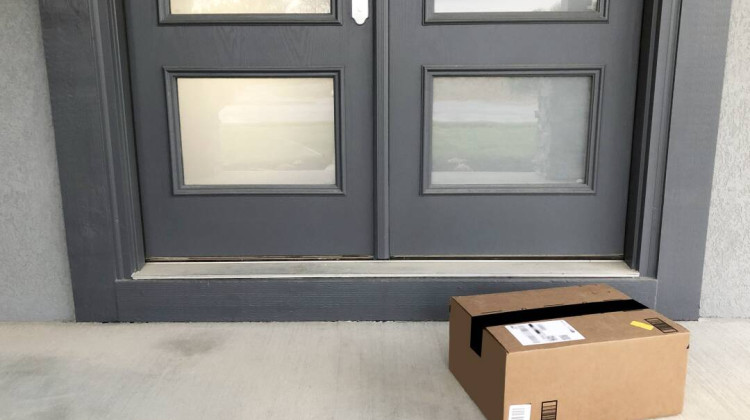
A sign urges lawmakers to fund Medicaid expansion at a rally in support of the program at Missouri's capitol in Jefferson City on April 27, 2021.
Sebastián Martínez Valdivia/KBIAMedicaid expansion has been a contentious issue across the U.S., and in Missouri, battle lines are drawn at the highest levels of government. State residents voted to expand the health insurance program. But the legislature balked at funding it and the governor says the state will not offer coverage to the estimated 250,000 newly eligible Missourians. That triggered a lawsuit on behalf of three people eligible under expansion. Side Effects Public Media's Sebastian Martinez Valdivia discusses the suit with Lowell Pearson, one of the plaintiffs' attorneys.
TRANSCRIPT:
Pearson: We’re asking the judge to order the defendants, who are officials within the Department of Social Services, to take the steps necessary to place the newly eligible Medicaid population into the system by enrolling them, and then by providing benefits to them starting July 1, as they’re entitled to under the Missouri constitution.
Side Effects: There’s an idea that the [Missouri Department of Social Services] wasn’t appropriated a certain amount of funds to cover the expansion population. But that’s not really how it works, is it?
Pearson: Yeah that’s a misconception that a lot of people have talked about but it’s really not true. The way that the Medicaid program is funded by the state is in program units, so pharmacy, mental health, whatever. It doesn’t appropriate the money by groups of eligible populations. So starting on July 1, there’s plenty of money appropriated to cover these people with the same services that everybody else gets, and that’s what the state ought to do.
Now, it is not uncommon for the state to have to appropriate additional money for Medicaid during the middle of the fiscal year. That happens almost every year because of course it’s always hard to estimate exactly how many people will be in the program, and what kind of care they will require. So while there are some media reports that would indicate this is an unprecedented situation, it’s actually quite routine, and state has all the tools it needs to put these people into the program July 1.
Side Effects: What do you expect the counter-argument to be from the state in response to this?
Pearson: Well, I guess the state will focus on the separation of powers point that the legislature doesn’t have to appropriate the money. That’s what I would expect them to say. And that’s true in the general sense, but I don’t think it’s true here, where we have a constitutional right to this health care. So, ultimately, I suppose the court will have to measure those two constitutional principles and decide which one is the more important. We think since the voters said last August that these 200,000-plus Missourians are eligible for Medicaid, and put that in the constitution, we think that’s the way the court ought to go, for sure.
Side Effects: How did you first come to be involved in this case?
Pearson: I’ve been working on this issue for probably three years at least. There was a group of people who came together to put the measure on the ballot and then pass the measure. A broad coalition of people who are interested in Medicaid reform. And they came and asked me if I’d like to do the legal work, and I said I would. So I’ve been working this issue for quite a while, back to drafting the original petition that was ultimately on the ballot and supported by the voters.
Side Effects: You’ve been involved in politics for most of your career; did you see things with expansion heading in this direction after the ballot measure passed, and if so, when did you anticipate they might head this way?
Pearson: Well, I always knew there was a possibility that we would end up in this spot. If you read the newspapers you could see that certain members of the Missouri General Assembly seemed to be indicating a lack of interest in funding. I would say starting about the first of April when the budget was really getting its motor going, passing in the House and then in the Senate, it became pretty clear to me that the legislature was not going to fund the measure at the level the governor had asked for. Remember, Gov. [Mike] Parson under the constitution has to propose a budget, which he did in January, and he specifically referenced enough funds, he thought, to cover newly eligible people for the year. But it became apparent in April or so that the legislature was not going to adopt the governor’s proposed budget so we started thinking this litigation might well be necessary.
Side Effects: What are the next steps now that you’ve filed this and what’s the timetable that you would anticipate for this case?
Pearson: Well, our intention is to push the case quickly and obtain the necessary order from the court for these folks to have coverage on July 1. We have every intention of that occurring. That doesn’t mean that the case will be decided once and for all by that point. It could be, but more likely there would be some sort of preliminary order saying that the state has to cover these folks on July 1 as they’re entitled to be covered, and then there might be some court proceedings after that.
But I expect this case to go through the trial court and the court of appeals quite quickly. The lawyers involved on our side and the lawyers for the Attorney General’s Office who are representing the defendants are all very experienced in expedited litigation. All of us have practices that involve ballot measures. You may recall that last year there was a challenge to the form of the Medicaid expansion petition just about this time last year, and I think we went from filing the initial lawsuit to the decision by the court of appeals in something like 17 days. So this might not be quite that quick, but we expect to obtain the necessary order from the court sometime in June.
 DONATE
DONATE





 View More Articles
View More Articles



 Support WFYI. We can't do it without you.
Support WFYI. We can't do it without you.